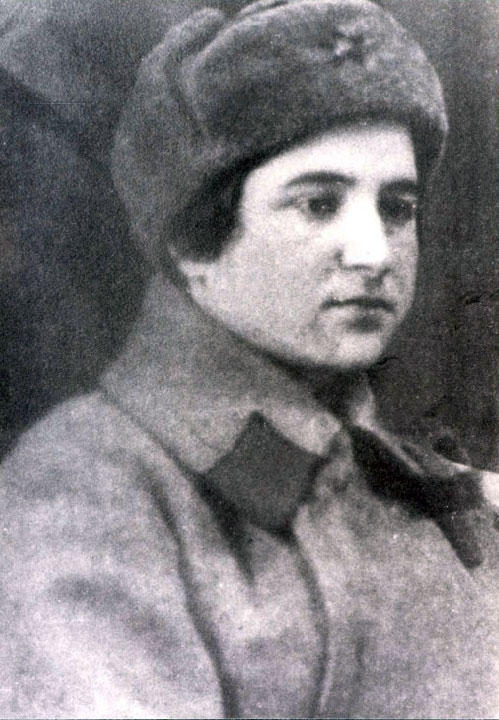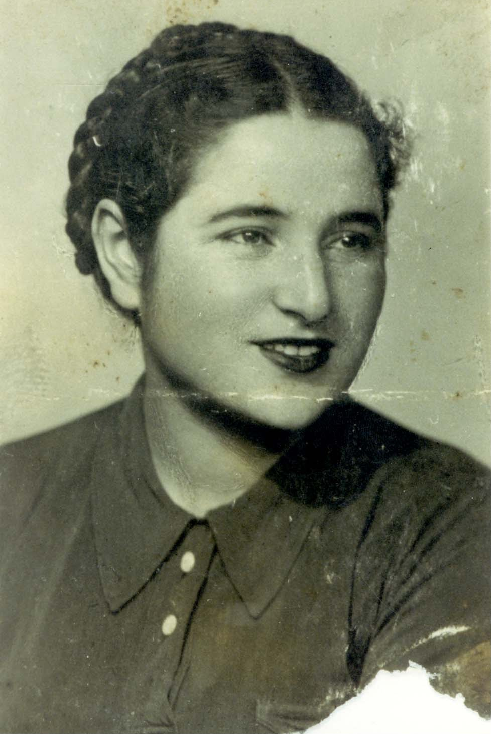Regina Brudinger was born as Rivka Sztokhamer in Palahychi, east of Stanisławów, in Eastern Galicia, Poland (now Ivano-Frankivsk Region, Ukraine), probably in 1922,1 to a traditional Jewish family. Her father Abram was a hazan (cantor) at a local synagogue. Her mother died in 1930. In the 1930s, the family moved to the nearby town of Tłumacz, where Regina was caught by the Soviet invasion of Eastern Galicia in September 1939. Under the Soviets, Regina moved to Lwów, where she started studying at a teachers' institute.
On June 23, 1941, the second day of Operation Barbarossa, Regina Sztokhamer volunteered as a nurse at a military hospital located in Lwów. Some days later, her hospital was evacuated to Kiev. Thereafter the hospital staff, including Regina, was evacuated further eastward, ending up in Saratov, on the Lower Volga, Russia. Although Regina wore a Red Army uniform, the hospital operated as a civilian one. Frustrated by this, in September 1942 Regina volunteered to join the Red Army. After a short training period, nurse Sztokhamer was assigned to a field hospital close to the front, in the area of Voronezh, southern Russia.
Regina Sztokhamer recalled her service in the area of Voronezh and, then, in Stalingrad in the winter of 1942-1943 as a veritable inferno. She was profoundly shocked by the hundreds of soldiers, many of whom were young like her, bleeding and screaming with pain some with their limbs cut off, some dying in agony. She also lamented surgical operations being carried out without or almost without anesthesia – under frequent enemy bombing and shelling, along with the suffering caused by shortages of food and medicine. In February 1943, the German forces in Stalingrad surrendered, and enemy soldiers, either wounded or frostbitten, began to arrive at the hospital. Regina noted that the hospital admitted Romanian POWs for treatment, but refused to take the German POWs.
One of Regina's painful recollections of her service in Voronezh and Stalingrad concerned her friendship with the doctor Rita Ryvkina. Ryvkina had been born in Soviet Ukraine to a religious Jewish family. The two daughters of traditional families, the Polish Jew Regina Sztokhamer and the Soviet Jew Rita Ryvkina had much in common. They used to talk during their brief periods of rest. The deputy commander for political matters of the hospital did not like two Jewesses speaking in their Yiddish "gibberish" so, after several "conversations" with each of them, he had Regina's only friend transferred to another hospital.
In 1943 Regina served in various hospitals in the area of Kursk, southern Russia. There she experienced another kind of hell: in addition to having to treat many of the wounded, these hospitals were a veritable realm of typhus and dysentery, with many soldiers dying of these diseases.
In August 1943 Regina was sent for advanced nursing studies. However, this did not last long since, in the same month, she was arrested twice – first for an unwarranted absence from service, then for displaying a lack of respect for her commander. After her second arrest, she was transferred to a reserve battalion with the ludicrous position of "editor of the battalion (sic) newspaper." At that point, the battalion commander took a fancy to her: within a short time he proposed that she become his mistress and tried to rape her. Sexual harassment was not a new experience for Regina, but in all the previous cases, she had succeeded in repulsing the Red Don Juans without dire consequences. This time, however, Regina's refusal had more dramatic results: the following day she was detained as a "Polish citizen" and included into a group of "foreigners" to be deported to Siberia.
After a month, Regina found herself in Kuzbass, Western Siberia, where she worked in the coal mines. She was shocked to see that most of the coal miners were women. Sexual harassment continued to be her lot there too. Within a short time, following the advice of a local friend, as a former student of the Lwów teachers' institute, she continued her education, by correspondence, at the teachers institute in Novokuznetsk (at that time Stalinsk), the de facto capital of Kuzbass.
In 1944 Regina Sztokhamer found a job as teacher at a school in Kurgan, in the Urals, and left Kuzbass forever. However, her employment at the school did not last long: after being overheard saying that life in prewar Poland had been good, she was dismissed from her job. In the summer of 1944, Regina volunteered to be a military nurse with the 1st Tadeusz Kościuszko Infantry Division – a Polish anti-Nazi division that was subordinated to the Soviet supreme military command and underwent re-formation at this time. With this division, she entered Poland and worked at the military hospital in Chełm. In the same year she was shocked to see rabidly antisemitic posters in the recently liberated Chełm – not posters left behind by the Germans, but ones compiled by some Polish "patriots."
Regina's father and three siblings perished in the Holocaust; only her brother Yisrael survived.
After the war Regina Sztokhamer Brudinger settled in Israel. She lived on the kibbutz Afikim and worked as a nurse.
[based on Brudinger's wartime diary published in Hebrew as Regina Brudinger, Yoman bamilhama: yomana shel aḥot besherut hatsava haadom bemilhemet ha'olam hashniya, Tel Aviv: Hakibbutz hameuḥad, 1990]
- 1. In her wartime diary written in Polish, Sztokhamer – Brudinger did not note the year of her birth. In 1982, in Israel, she edited her diary and had it translated into Hebrew. The Hebrew version was published as Regina Brudinger, Yoman ba-milḥama: yomana shel aḥot be-sherut ha-Tsava ha-Adom be-Milḥemet ha-Olam ha-Shniya, Tel Aviv: Ha-Ḳibuts ha-Meuḥad, 1990.








